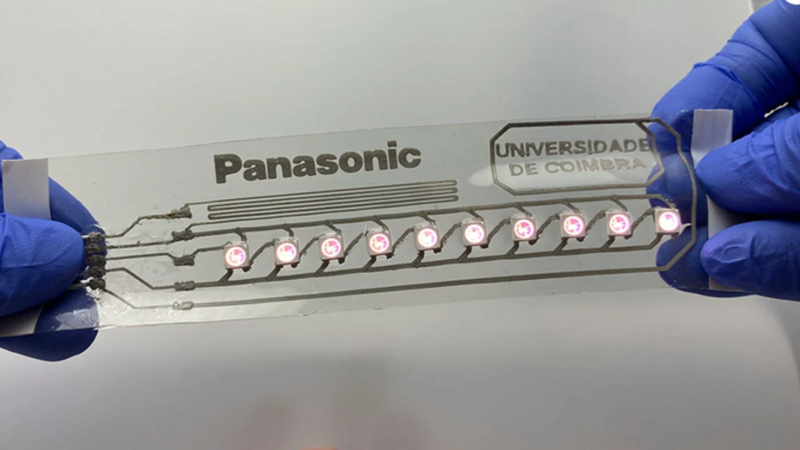A Novel Substrate for Soft Circuit Solutions: Case Studies and Results
A novel stretchable film has been developed for soft & stretchable circuit / electronic solutions, outperforming existing films like TPU. Here you can learn about case studies showcasing its potential in pliable PCBs, stretchable hybrid PCBs, and truly stretchable electronics.
This article was first published on
www.techblick.comThis article was written by Tsuyoshi Takeda from Panasonic for TechBlick and first appeared on this link. The Electronic Materials Business Division of Panasonic Industry Co.,Ltd. (Panasonic) is a premier supplier of electronic materials like printed circuit boards laminates, semiconductor packaging materials, display films and other leading-edge products.
Leveraging our core expertise in high-performance thermosetting polymer chemistry, we developed BEYOLEX™, a fully cross-linked, non-silicone, thermosetting stretchable film. BEYOLEX™ is specifically designed as a soft, stretchable, and durable substrate for reliable printed electronics. BEYOLEX™ exhibits superior performance when compared to existing stretchable films like Thermoplastic Polyurethane (TPU) and Polydimethylsiloxane (PDMS) and is under evaluation and qualification for a wide variety of demanding applications. In collaboration with our innovative partners, Panasonic introduces our latest case studies on soft circuit development which is one of the promising applications of BEYOLEX™.
Case Study 1: Pliable PCB made with copper sintering ink
InnovationLab and Panasonic developed a pliable PCB demonstrator. This device was designed and manufactured by InnovationLab using BEYOLEX™ and sintered copper ink. Generally, the copper inks require a high sintering temperature (>160 °C), which is extremely challenging for TPU. As can be seen in Pic 1, the BEYOLEX™ substrate had no difficulty tolerating the sintering temperature and exhibited no damage from the process. Furthermore, the combination of the high temperature tolerance of BEYOLEX™ and the solderability of the sintered copper ink enabled component mounting with standard solders such as Sn-Bi or SAC305: resulting in reliable and high density assemblies and delivering a functional PCB with more pliability and softness than typical flexible printed circuits (FPCs.)
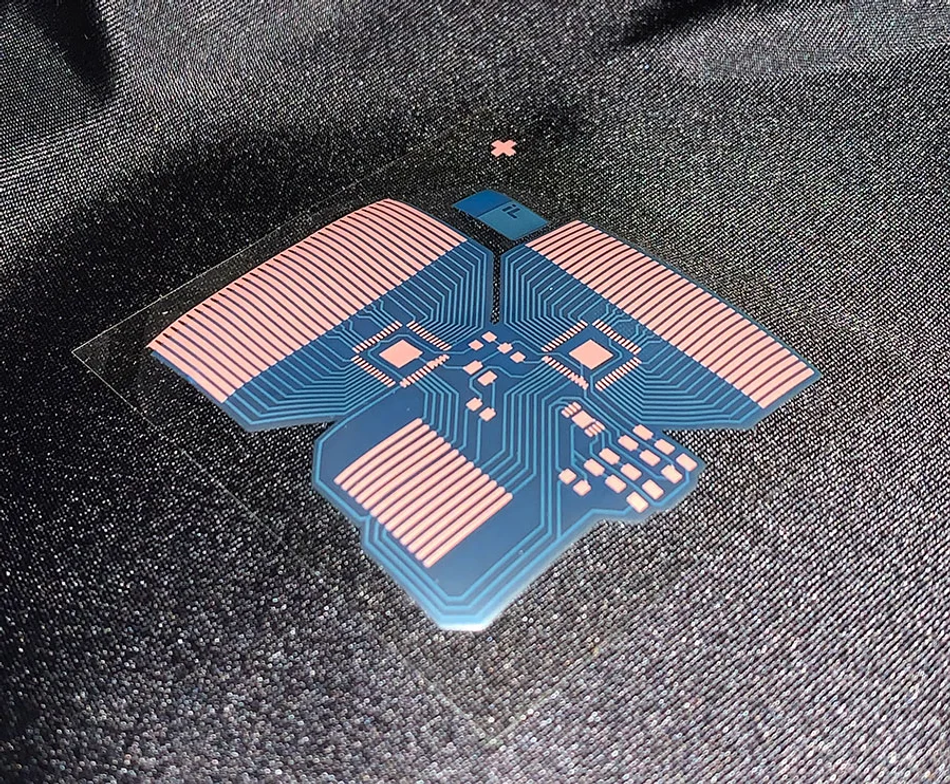
Pic 1: Pliable PCB made by InnovationLab
Panasonic will be exhibiting at the TechBlick event on the Future of Electronics RESHAPED. Please join us in Berlin on 17-18 OCT 2023. More info here
Case Study 2: Stretchable hybrid PCB made using copper ink and stretchable silver paste
Kelenn Technology, a leading manufacturer of printing equipment, also makes functional inks that are customized for their printing systems. Using their proprietary Direct Material Deposition (DMD) technology, Kelenn Technology printed land pads with copper ink and circuit traces with stretchable silver-based paste onto BEYOLEX™ film (Pic 2). This hybrid circuit produced a solderable, stretchable PCB configuration that would be difficult to achieve with copper circuitry alone. Definitely, BEYOLEX™ is the only substrate solution for this design.
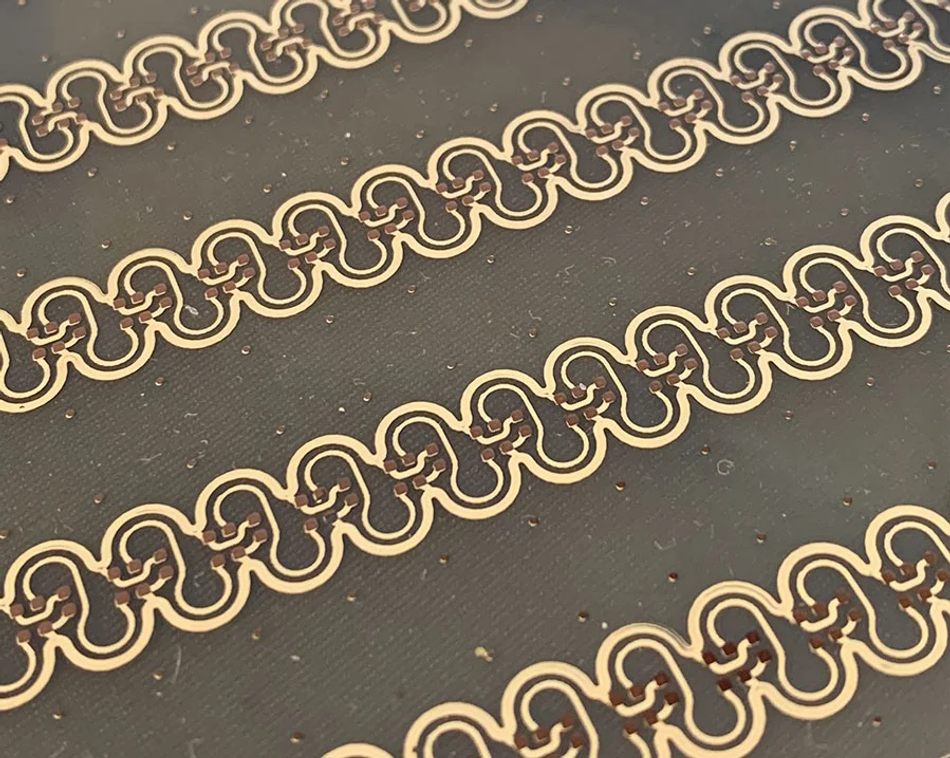
Pic 2: Stretchable PCB made by Kelenn Technology
Subsequently, Panasonic engineers reflowed solder paste onto test vehicles prepared by Kelenn Technology. We printed an industry standard SAC305 solder paste and reflowed the part in a Vapor Solder Oven with a temperature of 230°C. We confirmed both the solderability of the copper ink pads provided by Kelenn Technology as well as the mechanical integrity of BEYOLEX™ after soldering (Pic 3). As a result of this test, we believe BEYOLEX™, with sintered copper ink, is a promising solution for solderable, pliable or even stretchable PCB constructions.
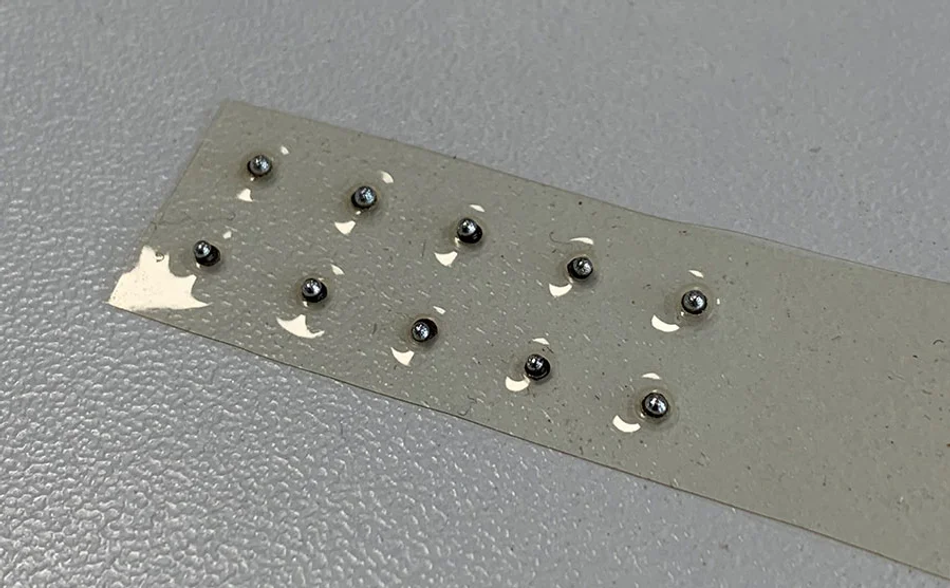
Pic 3: Soldering on Cu
This technology will be presented at TechBlick's event in Berlin on 17-18 OCT 2023. You can learn more info here. This is the most important global event on printed electronics, stretchable and soft electronics, and wearable electronics.

Case study 3: Tackling the challenges of truly stretchable electronics
Stretchable silver pastes are an attractive conductor solution for new form factor devices. However, these polymer composite pastes have inherent limitations for forming truly stretchable electronics; typically, the resistance increases significantly with each elongation cycle and these increases are cumulative, climbing with each stretch cycle. A printable Liquid Metal Based Composite developed by University of Coimbra (UoC) is a promising solution to this issue. UoC’s ink exhibits metallic conductivity and much lower resistance change during stretch cycles compared to silver-polymer pastes. Thanks to the lack of plastic deformation of BEYOLEX™, UoC’s ink printed on BEYOLEX™ looks to be a promising combination for truly stretchable electronics requiring repeated stretching (Pic 4).
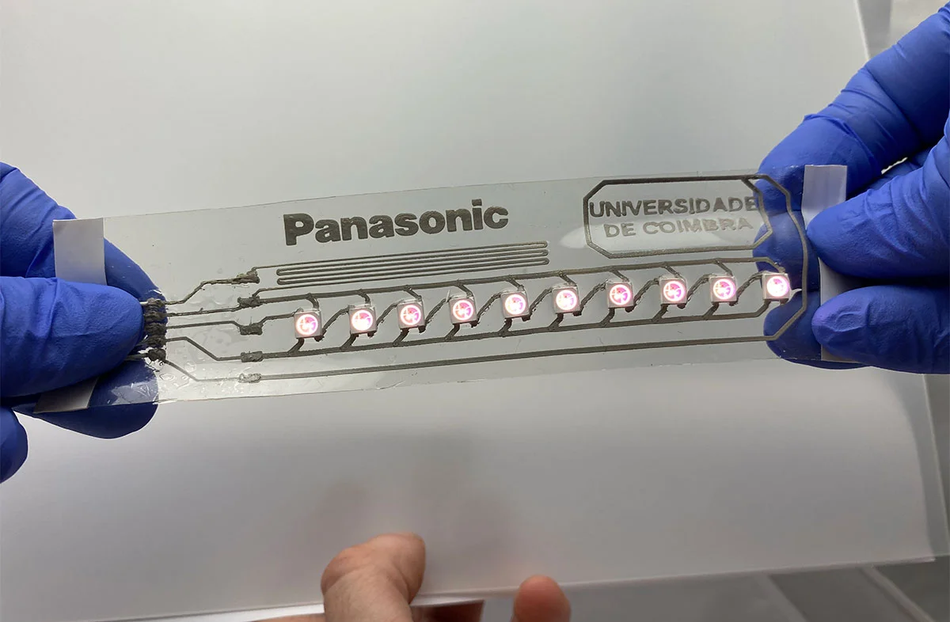
Pic 4: Stretchable LED with capacitive touch by UoC
The soft-circuit solutions made with BEYOLEX™ introduced in this article are made by additive printing processes which are generally more environmentally friendly than the conventional subtractive PCB fabrication process. Panasonic’s Electronic Materials Business Division keeps contributing to create value and to society through innovative materials.
Panasonic will be exhibiting at the TechBlick show on The Future of Electronics RESHAPED in Berlin on 17-19 OCT 2023. You can find more information here
